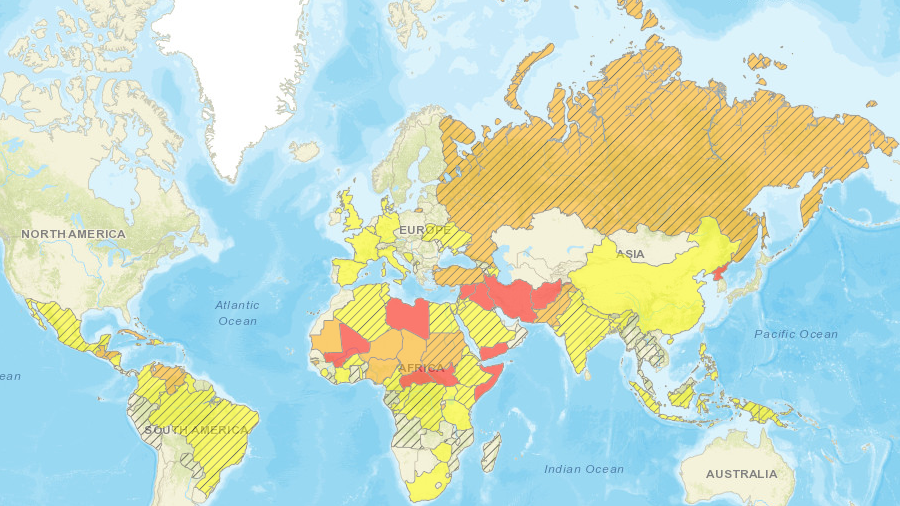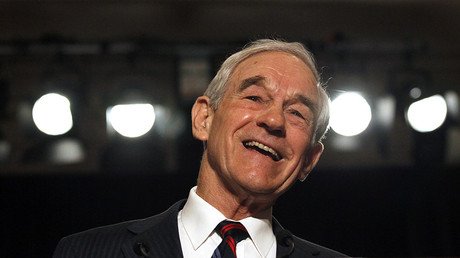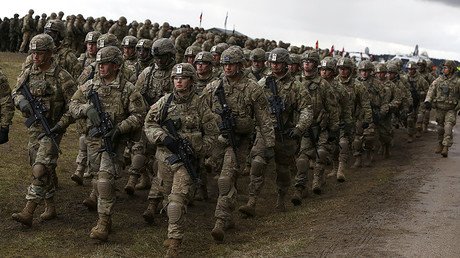Twitter ridicules State Dept. after it urges US citizens to ‘reconsider travel’ to Russia

The US State Department found itself the focus of social media jibes after an overhaul of its travel safety warning system downgraded Russia to the same category as Mauritania, Sudan and other trouble spots.
The move, explained as “due to terrorism and harassment,” comes at a time of heightened tensions between Washington and Moscow and just five months before Russia hosts the 2018 FIFA World Cup.
The new State Department classification sees countries divided into four zones, when it comes to personal security. Russia has been bundled into the “orange” category (the 2nd most dangerous of the quartet), meaning US citizens should “reconsider travel” to this destination.
Twitter was ablaze on Thursday and Friday with condemnation of Russia’s “orange” status. For instance, Mark Galeotti, a pundit at US State Broadcaster RFE/RL described it as “absolutely ridiculous.”
“Whether a political move or stupidity, truly ludicrous,” the Russia watcher commented.
#US#StateDepartment travel advisory puts #Russia in cat 3 of 4: "reconsider travel" - ostensible "due to terrorism and harassment". This is absolutely ridiculous. Whether a political move or stupidity, truly ludicroushttps://t.co/rtOvj9NwjK
— Mark Galeotti (@MarkGaleotti) January 11, 2018
The State Department itself claims the changes are part of an “effort to streamline information on threats overseas and present it in a clearer, more direct fashion” at a “time of increased travel – 2017 was on track to be a record year for the number of Americans travelling abroad. In 2016, there were over 80 million Americans who went overseas.”
Some users have suggested the decision may be more political than practical.
Leonid Ragozin, an author at Lonely Planet, protested “if travel advisories are a tool of punishing countries for aggressive behavior, of which Russia is clearly a culprit, then fair enough. But if the idea is to provide accurate info for citizens, then it is a piece of garbage.”
State Department’s new paranoid travel advisory on Russia discredits the idea of travel advisories - it misleads US citizens by giving a grossly inaccurate picture of a country that is generally safe to travel. Seriously, why replicate Kremlin’s insanity? https://t.co/XxKhPg4xOm
— Leonid Ragozin (@leonidragozin) January 11, 2018
Ukraine, currently enduring a civil war in its east and frequent social unrest in the capital, is placed in the yellow band, which only requires Americans to “exercise increased caution.” Meanwhile, Kosovo, a partially recognized entity associated with human-organ trafficking, widespread corruption and organized crime is also considered safer than Russia.
Crucially, both Kosovo and Ukraine are US allies, whereas Russia is regarded one of the top foes in Washington amid unproven allegations of election meddling and geopolitical tensions in Europe and the Middle East.
The advisory includes a warning that “terrorists may attack with little or no warning, targeting tourist locations, transportation hubs, markets/shopping malls, and local government facilities. Bomb threats against public venues are common,” which could equally be applied to any other major European country these days including Germany, France and the United Kingdom – all of which have category two safety grades.
As reporter Fabrice Deprez pointed out, the French Foreign Minister has declared Russia “all safe, except for the South (sic) Caucasus.” The North Caucasus, located in the south of Russia, is a region where counter-terrorism operations are frequent.
Following the State Department's controversial travel advisory on Russia, here is the same advice from the French ministry of Foreign Affairs: all safe, except for the South Caucasus. Seems a bit more legit. https://t.co/ZjfgxS15APpic.twitter.com/1qTNcnXXGf
— Fabrice Deprez (@fabrice_deprez) January 11, 2018
The State Department also advised against travelling to Crimea. “The US government is unable to provide emergency services to US citizens travelling in Crimea as US government employees are prohibited from travelling to Crimea,” it contends. However, Russian authorities do not prohibit US government employees from visiting the peninsula. Instead, it is actually the US government which has introduced the ban, for its own reasons.
Russian Foreign Ministry spokeswoman Maria Zakharova called the move “another unsubstantiated statement, whose primary goal is to trigger another round of anti-Russian hysteria in the US, and to cultivate blind fear of Russia among Americans.”
Foreign travelers to Russia spoke of experiences that were far from scary. Ciaran Deely, from London, explained: “In Summer 2017 I travelled [for] 3 weeks [on] the Trans-Siberian Railway through [St] Petersburg, Moscow, Vladimir, Suzdal, Nizhny Novgorod, Perm, Yekenterenburg, Irkutsk, Lake Baikal, Ulan Ude… and can honestly say not once did I feel unsafe. Welcoming people! Far more danger in London or Dublin.”
In Summer 2017 i travelled 3wks the Trans-Siberian Railway through Petersburg, Moscow, Vladimir, Suzdal, Nizyhn Novgorod, Perm, Yekenterenburg, Irkutsk, Lake Baikal, Ulan Ude...and can honestly say not once did i feel unsafe. Welcoming people! Far more danger in London or Dublin.
— Ciaran Deely (@CiDeely) January 11, 2018
The renowned Ukrainian pianist Valentina Lisitsa recalled a 2017 visit. “Sevastopol. Taking city walks at 2am, myself with my kid, to feed dozens of cats. Using [a] flashlight on dark street stairs and alleys without fear of strangers in the dark. An eerie feeling of time travel back to USSR, where, as a kid, the fear of strangers or crime didn’t exist. (),” she wrote. Lisitsa compared it to her first visits to the US. “And then the culture shock of America: no, it’s not a good idea to take a walk in downtown Miami – or NYC Central Park after dark. And we thought [it was] Soviet propaganda and scare tactics when we read about it.”
Meanwhile, Donal McAllister, an Oman-based Irishman, gave a slightly different testimonial. “Other than usual slightly menacing taxi drivers at [the] airport, [I] have to say [I] loved walking around Moscow, amazing city. At night, felt more uneasy but never had any hassle.”
Hunter Cawood, an American in St Petersburg, also disagreed with the State Department. “I’ve lived in Russia for a year and a half now, and I can genuinely say that I’ve never once felt unsafe,” he said.
I’ve lived in Russia for a year and a half now, and I can genuinely say that I’ve never once felt unsafe.
— Hunter Cawood (@HunterCawood) January 11, 2018
And Michael Boyle, from Arizona, echoed his compatriot. “Very safe everywhere from St Petersburg to Irkutsk (including the Trans Siberian Railroad). The only questionable place was the St Petersburg-Moscow overnight train but even that was safe if you weren’t an idiot looking for trouble,” he tweeted.
London-based Chris McNee was even more positive: “I travel every few months to Russia and feel always very safe. More so than Paris London or NY. Worked all over and, touch wood, never really a problem.”














